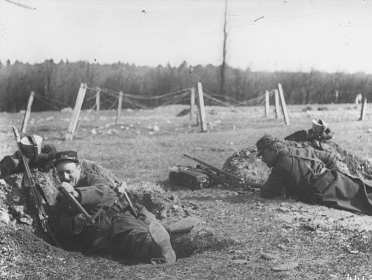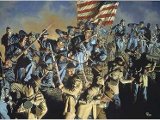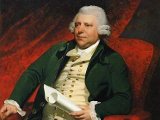First Battle of the Marne (September 5 – September 12, 1914)

The First Battle of the Marne was fought between the French army aided by the British Expeditionary Force (BEF) and the Germans from September 5 and September 12, 1914. It ended the series of German victories in the Western front and set the beginning for the long and exhausting trench war. The battle, also called the Miracle on the Marne resulted in heavy casualties on both sides but the defeat of the German army ended the German hopes for a quick victory in the west which would according to the Schlieffen Plan enable Germany to avoid fighting on two fronts. The Germans assumed that Russia will need time to mobilize which would give them enough time to defeat France and then concentrate all their forces against Russia in the east and win the war.
Within a month after the declaration of war on France, the Germans were less than 30 miles from Paris, while the exhausted French Fifth and Sixth Armies and the BEF were withdrawing. In addition, the relations between the commander of the BEF Field Marshal Sir John French and the French commanders were highly tense as Field Marshal French blamed the French generals for heavy losses. He even planned to withdraw along the lines of communication to reorganize his troops. French changed his mind only after the British War Secretary, Herbert Kitchener intervened personally and persuaded French that his move would have disastrous consequences for both the French and the British.
On the eve of the First Battle of the Marne, the German victory in the Western front appeared to be near and the French government that was expecting the fall of Paris left the capital for Bordeaux. However, the Germans made a serious tactical error when they moved north from Paris with an aim to envelope the retreating Allied forces. By doing so, the German First Army commanded by General Alexander von Kluck exposed itself to an attack from the flank and a counter-envelopment due to a 30 mile gap that occurred between the German First Army and the Second Army under the command of General Karl von Bülow.
Allied reconnaissance planes discovered the gap and reported about it to the Allied commanders on the ground who decided to take advantage of it and launched a counter-attack on September 6. Kluck noticed the Allied approach but it was already too late. He ordered an attack to break through the Allied lines and nearly crushed the Sixth Army when the Parisian taxi cabs transported 6,000 reservists to aid the Sixth Army. The role of the Parisian taxi cabs is often described as the decisive factor in the outcome of the First Battle of the Marne but many modern historians believe that the influence of the Parisian taxi cabs on the course of the battle was probably exaggerated. They had, however, a major impact on the French morale.
After three days of fighting, the tide of the battle turned in favor of the Allies and the Germans were threatened by encirclement. On September 9, General Helmuth von Moltke ordered retreat to the Aisne River. The Allies pursued the Germans but the fighting was over by September 12 when both sides dug in at the Aisne River. The First Battle of the Marne was fought by over two million of men of which 500,000 were killed or wounded. The French lost 250,000 men, while the German casualties totaled 220,000. The BEF suffered nearly 13,000 casualties.




